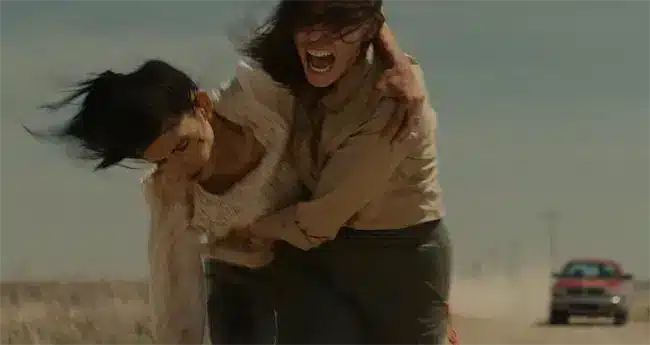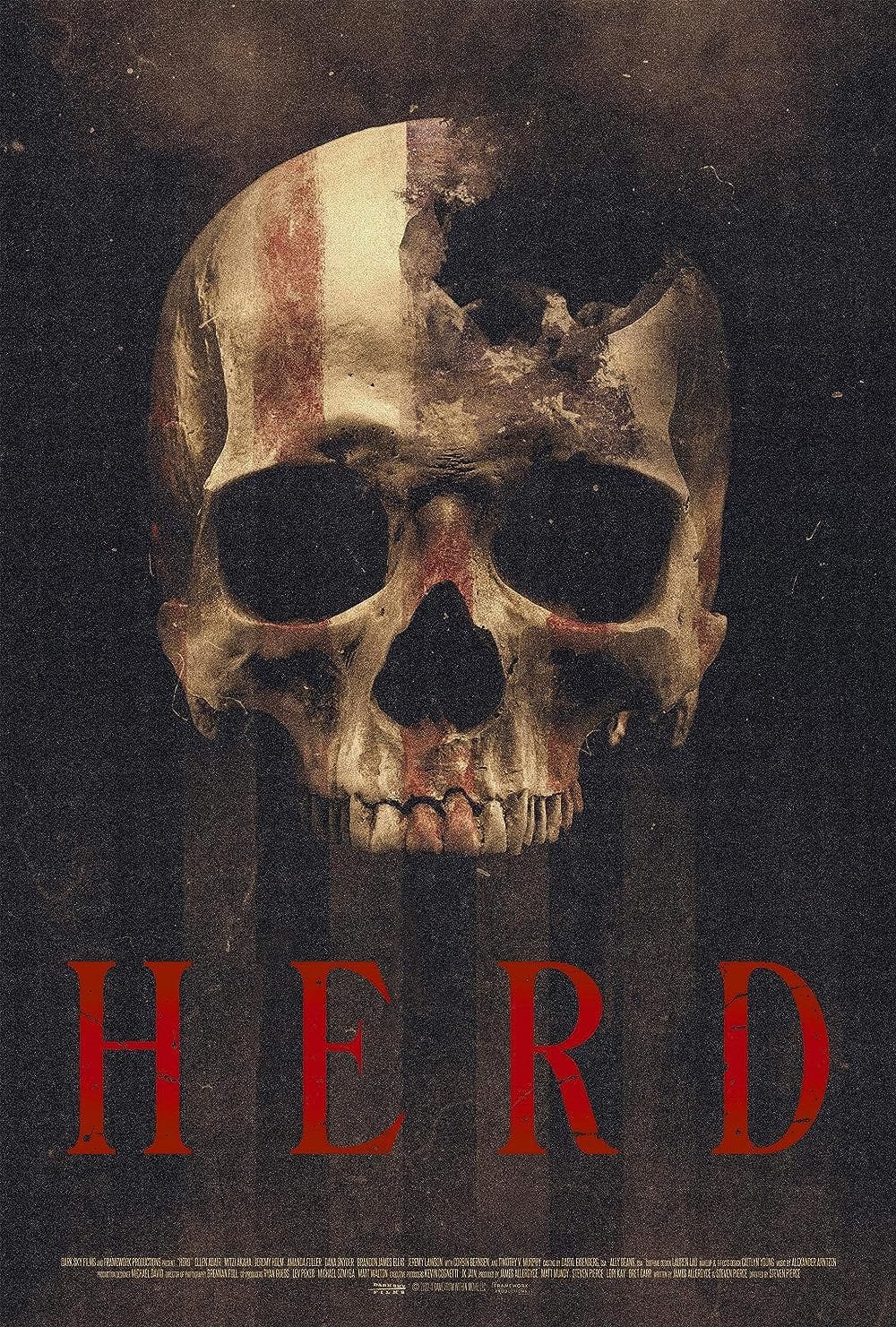
At this point, a good zombie film feels like a noble tradition for many horror fans but also, given the number and the scope of zombie horrors down through the years, it’s acceptable to be a little picky. Not only did the birth of zombie cinema kickstart a new, nasty, unrelenting kind of horror, but it’s proven very versatile, standing in for myriad social anxieties as well as offering an outlet for plot-lite, but gratuitously grisly movies too. Or indeed, it’s done all of these things together. So it’s with a heavy heart that it turns out Herd (2023) neither expounds an interesting backstory nor shows us a truly horrific vision of a world gone awry. There are some good elements here; there are some interesting ideas here. But there are also issues, which either keep things feeling too derivative or just spread those decent ideas too thinly.
We start promisingly, with a strangely bucolic, rural landscape: it’s probably fair to say that a lot of zombie horror has tended to be urban, and this clearly isn’t. But the panning shots of golden fields and dotted farms end abruptly as we glimpse an older man, fleeing through this farmland, before stopping off at a barn to gather supplies before he tries to connect with others. Via him, we also encounter one of our perishingly few zombies – not a runner, and not particularly aggressive, but dangerous nonetheless.
As the man struggles with him/it, he misses a call from a young woman whom we can soon infer is his daughter, Jamie. And we then cut to Jamie (Ellen Adair), seemingly unaware (or hardly bothered) about any mysterious outbreak, and instead preparing to go on a relationship-saving canoe holiday with her partner Alex (Mitzi Akaha). You may be forgiven for thinking that few relationships, even robust ones, could survive such a thing, and you may be right: it’s tense, it’s awkward, and it’s a dreadfully confined location for a potential break-up. Perhaps the accident which cuts all of this rowing short is a blessing in disguise, but when Alex hurts her leg it makes Jamie and Alex move a lot slower, and what’s more, they now seem to be deep in enemy, i.e. Jamie’s family’s terrain.
They then get overtaken by a ragtag bunch of rural residents, trying to get back to the safety of their small community. It seems the outbreak situation has developed, and requires people to hunker down, to wait for the whole thing to blow over (a definite possibility here, as it happens). But this isn’t easy for Jamie, as it turns out some of these guys know her, and she winds up heading back to her old home town – a place she left in bad circumstances, particularly with regards to her relationship with her father.
My feelings on Herd changed after its first thirty minutes or so: its early scenes promised decent-looking, if familiar (and if somewhat declawed) zombie action, even if the whole ‘couple who must be reminded why they love each other’ is a well-used trope which is very easy to spot. Sure, it’s a strange feature of the script that it seems Jamie and Alex are perfectly aware of some strange, dangerous illness appearing around the country, but they head straight for it anyway. Still, initially, the action ramps up quite nicely, and whilst there are lots of familiar elements here (short of a military checkpoint, a band of men in fatigues or plaid carrying guns are almost obligatory) the performances are earnest enough. There’s some good, practical SFX, if conserved rather carefully, no doubt for reasons of budget. All in all, it’s made to look as though some grand crisis is coming, and it’s going to create an unbearable pressure cooker of human emotions as it unfolds. Fine, that’ll do just fine; that’s more than enough for a good film.
Sadly, at this point things grind largely to a stop. Once hunkered down, the film tries to become a character study, looking at this claustrophobic situation and what it tells us about our key players. Whilst surprisingly little happens outside, it turns out Jamie and Alex just aren’t quite up to sustaining the weight of the run time, and it also feels like making it all about hot topics like sexuality (and to an extent, class) is an attempt to hot-house engagement with these characters. There’s some attention paid to the ‘man is the real monster’ idea, but given the fact that the zombies aren’t particularly menacing, it doesn’t feel as substantial as it might have done. We have quite a problem with disparity of threat from the obviously-influenced-by-The Last Of Us zombies – who come replete with fungal-type growths – as they are fairly non-aggressive, largely avoid conflict and can be circumnavigated easily, eventually for good. As such, all of the human drama which unfolds feels a little unconvincing, even with the zombie element in its midst, and any surprises which the film rocks out in its final act only serve to diminish what precedes it.
With not quite enough horror and not enough plot development, Herd feels like rather a long lull after its initial set up. However, despite aspects which are patchy or predictable, it remains a visually appealing film, one with some sense of its heritage, but also some ideas of its own. This seems quite the departure for director Steven Pierce, whose directorial slate so far has consisted of shorts and music-oriented projects (there’s a far amount of live music present in Herd, come to think of it). There are elements of skill here, but some challenges to face too, and if Pierce is to make this kind of horror again he’d do well to consider how to balance pace against tension.
Herd (2023) had its European premiere at FrightFest 2023. The UK home entertainment release follows on 23rd October 2023 (High Fliers)
